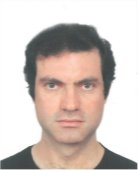Difference between revisions of "Amin Farjudian"
From CERES
| Line 26: | Line 26: | ||
* Domain specific languages for signal processing on heterogeneous architectures ([[ESCHER | ESCHER Project]]), with [[Tomas_Nordström | Tomas Nordström]]. | * Domain specific languages for signal processing on heterogeneous architectures ([[ESCHER | ESCHER Project]]), with [[Tomas_Nordström | Tomas Nordström]]. | ||
* Differential Equations (mainly PDEs and Rearrangement Theory), with [http://www.nottingham.edu.cn/en/science-engineering/staffprofile/behrouz-emamizadeh.aspx Behrouz Emamizadeh]. | * Differential Equations (mainly PDEs and Rearrangement Theory), with [http://www.nottingham.edu.cn/en/science-engineering/staffprofile/behrouz-emamizadeh.aspx Behrouz Emamizadeh]. | ||
| − | ** "''Rearrangement Optimization Problems: A Computational Perspective''", Slides. (For a very gentle introduction to rearrangement optimization problems.) | + | ** "''Rearrangement Optimization Problems: A Computational Perspective''", ([[media:2017-03-30-Amin-Spotlight Talk-Rearrangement Opt.pdf|Slides]]). (For a very gentle introduction to rearrangement optimization problems.) |
* Computability and Complexity in Analysis. | * Computability and Complexity in Analysis. | ||
| + | |||
| + | |||
== Selected Publications == | == Selected Publications == | ||
Revision as of 15:20, 3 April 2017
Contents
Amin Farjudian, Assistant Professor, Dr.
Family Name: Farjudian
Given Name: Amin
Role: Assistant Professor
Title: Dr.
Subject:
Organization: Center for Research on Embedded Systems
Email: Amin.Farjudian@hh.se
url: http://ceres.hh.se/mediawiki/Amin_Farjudian
Phone: +46-35-167846
Cell Phone:
Projects: ESCHER
Research Interests
- Domain specific languages for signal processing on heterogeneous architectures ( ESCHER Project), with Tomas Nordström.
- Differential Equations (mainly PDEs and Rearrangement Theory), with Behrouz Emamizadeh.
- "Rearrangement Optimization Problems: A Computational Perspective", (Slides). (For a very gentle introduction to rearrangement optimization problems.)
- Computability and Complexity in Analysis.
Selected Publications
- Behrouz Emamizadeh, Amin Farjudian, and Hayk Mikayelyan: An elliptic optimal control problem and its two relaxations, Journal of Optimization Theory and Applications, 172(2):455–465, http://dx.doi.org/10.1007/s10957-016-0983-1, 2017. (Preprint version)
- Behrouz Emamizadeh and Amin Farjudian: Existence and uniqueness of solutions for nonlocal p-Laplacian problems, Electronic Journal of Differential Equations, 2016(274):1–9, 2016. (Printed version)
- Yichen Liu, Behrouz Emamizadeh, and Amin Farjudian: Optimization problems with fixed volume constraints and stability results related to rearrangement classes, Journal of Mathematical Analysis and Applications, 443(2):1293–1310, http://dx.doi.org/10.1016/j.jmaa.2016.06.017, 2016. (Preprint version)
- Behrouz Emamizadeh, Amin Farjudian, and Mohsen Zivari-Rezapour: Optimization related to some nonlocal problems of Kirchhoff type, Canadian Journal of Mathematics, 68(3):521–540, http://dx.doi.org/10.4153/CJM-2015-040-9, 2016. (Preprint version)
- Amin Farjudian and Behrouz Emamizadeh: Absolute continuity in partial differential equations. Real Analysis Exchange, 40(1):209–218, 2015. (Preprint version)
- Amin Farjudian and Behrouz Emamizadeh: Maximal mean exit time related to the p-Laplace operator. Applied Mathematics E-Notes, 14:173–184, 2014.
- Behrouz Emamizadeh and Amin Farjudian: Monotonicity of the principal eigenvalue related to a non-isotropic vibrating string. Nonautonomous Dynamical Systems, 1:123–136, 2014.
- Jan Duracz, Amin Farjudian, Michal Konečný, and Walid Taha: Function Interval Arithmetic. In Hoon Hong and Chee Yap, editors, Mathematical Software ICMS 2014, volume 8592 of Lecture Notes in Computer Science, pages 677–684. Springer Berlin Heidelberg, 2014. (Preprint version)
- Amin Farjudian and Behrouz Emamizadeh: Some Results on Radial Symmetry in Partial Differential Equations. New York Journal of Mathematics. 20:241–255, 2014.
- Amin Farjudian: On the Kolmogorov complexity of continuous real functions. Annals of Pure and Applied Logic. 164(5):566–576, May 2013. (Preprint version)
- Michal Konečný and Amin Farjudian: Semantics of query-driven communication of exact values. Journal of Universal Computer Science, 16(18):2597–2628, 2010.
- Michal Konečný and Amin Farjudian: Compositional semantics of dataflow networks with query-driven communication of exact values. Journal of Universal Computer Science, 16(18):2629–2656, 2010.
- Amin Farjudian and Michal Konečný: Time complexity and convergence analysis of domain theoretic Picard method. In W. Hodges and R. de Queiroz, editors, Proceedings of the 15th international workshop on Logic, Language, Information and Computation, WoLLIC ’08, Edinburgh, Scotland, volume 5110 of Lecture Notes in Artificial Intelligence, pages 149–163. Springer-Verlag, 2008. (Preprint version)
- Amin Farjudian: Shrad: A language for sequential real number computation. Theory of Computing Systems, 41(1):49–105, 2007. (Preprint version)
- Amin Farjudian: Sequentiality in Real Number Computation. PhD thesis, School of Computer Science, University of Birmingham, UK, 2004. (Supervisor: Achim Jung)
- Amin Farjudian: Sequentiality and piecewise-affinity in segments of Real-PCF. Electronic Notes in Theoretical Computer Science, 73:3–43, October 2004. (Preprint version)
Trivia
- My Erdős number is 4: Paul Erdős ⇔ George B. Purdy ⇔ Geoffrey R. Burton ⇔ Behrouz Emamizadeh ⇔ Amin Farjudian
- According to Mathematics Genealogy Project I am an academic descendant of Leibniz, Euler, Gauss, Fourier, Hilbert, ..., Keimel, Jung, to name a few, as can be seen on this graph, which was produced using David Alber's Geneagrapher.
